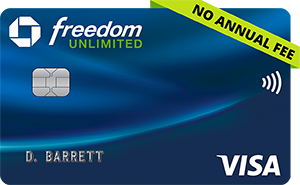Chase Freedom Unlimited® Review: $0 Annual Fee and Strong Cash Back Rewards
Accurate as of: November 16, 2025
The Chase Freedom Unlimited® is one of the most popular and versatile cash back credit cards on the market today. It offers a unique combination of a strong base earning rate on all purchases, bonus categories, a $0 annual fee, and a valuable introductory APR offer.
If you are looking for a straightforward, high-earning credit card that fits seamlessly into the larger Chase ecosystem, this review will cover everything you need to know.
Affiliate Disclosure: We are a professional review site that receives compensation from the companies whose products we review and recommend. If you apply for a credit card through our links (even indirectly through our affiliate partners), we may earn a commission. We are independently owned, and the opinions expressed here are our own.
Key Features & Benefits
The strength of the Chase Freedom Unlimited® card lies in its generous, straightforward rewards structure:- 5% cash back on travel purchased through Chase Travel℠.
- 3% cash back on dining at restaurants (including takeout and delivery).
- 3% cash back on drugstore purchases.
- 1.5% cash back on all other purchases (its signature feature).
Potential Drawbacks & Application Details
While the card is highly rated, there are a few drawbacks to consider:Is the Chase Freedom Unlimited® Right For You?
The Chase Freedom Unlimited® is an excellent card for the everyday spender who wants a simple, flat-rate cash back card without tracking bonus categories or paying an annual fee. The 1.5% base rate is very competitive.The rewards (technically Ultimate Rewards points) can be combined with premium cards like the Chase Sapphire Preferred® Card or the Chase Sapphire Reserve® to unlock much higher value travel redemptions.
Ready to apply?
Chase Freedom Unlimited®

- Intro Offer: Earn a $200 Bonus after you spend $500 on purchases in your first 3 months from account opening
- Enjoy 5% cash back on travel purchased through Chase Travel℠, our premier rewards program that lets you redeem rewards for cash back, travel, gift cards and more; 3% cash back on drugstore purchases and dining at restaurants, including takeout and eligible delivery service, and 1.5% on all other purchases.
- No minimum to redeem for cash back. You can choose to receive a statement credit or direct deposit into most U.S. checking and savings accounts. Cash Back rewards do not expire as long as your account is open!
- Enjoy 0% Intro APR for 15 months from account opening on purchases and balance transfers, then a variable APR of 18.24% - 27.74%.
- No annual fee – You won't have to pay an annual fee for all the great features that come with your Freedom Unlimited® card
- Keep tabs on your credit health, Chase Credit Journey helps you monitor your credit with free access to your latest score, alerts, and more.
- Member FDIC
See Card Terms and Conditions
Found this guide helpful? Bookmark it for future reference as you continue your financial journey!
Experian Boost: A Comprehensive Guide to Boosting Your Free Credit Score
FICO® Credit Scores
FICO® Score Ranges:
- Exceptional: 800–850
- Very Good: 740–799
- Good: 670–739
- Fair: 580–669
- Poor: 300–579
What is a Credit Score?
A credit score is a three-digit number, typically ranging from 300 to 850, that predicts your creditworthiness—how likely you are to repay borrowed money on time. Lenders use this score to assess the risk of lending to you and to determine the interest rates and terms of any credit you might receive.
Why is a Credit Score Important?
A credit score is important because it acts as your financial reputation. Lenders, landlords, insurers, and employers use this single number to quickly judge how reliable you are with money. A higher score helps you qualify for loans and credit cards, often securing lower interest rates that can save you significant money. Conversely, a poor credit score can lead to application denials or much higher costs for borrowing, making it a key factor in your overall financial opportunities.
FICO® Credit Score Facts
- Three-Digit Number: Like other credit scores, FICO® Scores are a three-digit number that summarizes a consumer's credit risk.
- Range: Most standard FICO® Scores range from 300 to 850. Higher scores indicate lower credit risk.
- Data Source: FICO® Scores are calculated using data from your credit reports maintained by the three major credit bureaus: Experian, Equifax, and TransUnion. Your score may vary slightly depending on which bureau's data is used.
- Industry Standard: Lenders rely on FICO® Scores for mortgages, auto loans, and credit cards because they provide a consistent, statistically sound assessment of the likelihood that a borrower will repay their debt.
Note: Credit scores are used to represent the creditworthiness of a person and may be one indicator to the credit type you are eligible for. However, credit score alone does not guarantee or imply approval for any credit card product.
